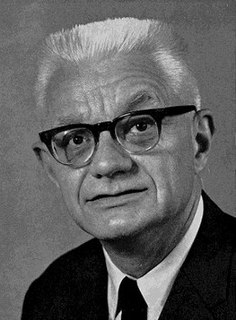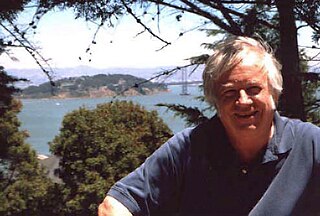Logical positivism, later called logical empiricism, and both of which together are also known as neopositivism, was a movement in Western philosophy whose central thesis was the verification principle. This would-be theory of knowledge asserted that only statements verifiable through direct observation or logical proof are meaningful. Starting in the late 1920s, groups of philosophers, scientists, and mathematicians formed the Berlin Circle and the Vienna Circle, which, in these two cities, would propound the ideas of logical positivism.

Philosophy of science is a sub-field of philosophy concerned with the foundations, methods, and implications of science. The central questions of this study concern what qualifies as science, the reliability of scientific theories, and the ultimate purpose of science. This discipline overlaps with metaphysics, ontology, and epistemology, for example, when it explores the relationship between science and truth. Philosophy of science focuses on metaphysical, epistemic and semantic aspects of science. Ethical issues such as bioethics and scientific misconduct are often considered ethics or science studies rather than philosophy of science.
Action theory is an area in philosophy concerned with theories about the processes causing willful human bodily movements of a more or less complex kind. This area of thought involves epistemology, ethics, metaphysics, jurisprudence, and philosophy of mind, and has attracted the strong interest of philosophers ever since Aristotle's Nicomachean Ethics. With the advent of psychology and later neuroscience, many theories of action are now subject to empirical testing.

Rudolf Carnap was a German-language philosopher who was active in Europe before 1935 and in the United States thereafter. He was a major member of the Vienna Circle and an advocate of logical positivism. He is considered "one of the giants among twentieth-century philosophers."

The exact sciences, sometimes called the exact mathematical sciences are those sciences "which admit of absolute precision in their results"; especially the mathematical sciences. Examples of the exact sciences are mathematics, optics, astronomy, and physics, which many philosophers from Descartes, Leibniz, and Kant to the logical positivists took as paradigms of rational and objective knowledge. These sciences have been practiced in many cultures from Antiquity to modern times. Given their ties to mathematics, the exact sciences are characterized by accurate quantitative expression, precise predictions and/or rigorous methods of testing hypotheses involving quantifiable predictions and measurements.

Carl Gustav "Peter" Hempel was a German writer and philosopher. He was a major figure in logical empiricism, a 20th-century movement in the philosophy of science. He is especially well known for his articulation of the deductive-nomological model of scientific explanation, which was considered the "standard model" of scientific explanation during the 1950s and 1960s. He is also known for the raven paradox.

Hans Reichenbach was a leading philosopher of science, educator, and proponent of logical empiricism. He was influential in the areas of science, education, and of logical empiricism. He founded the Gesellschaft für empirische Philosophie in Berlin in 1928, also known as the “Berlin Circle”. Carl Gustav Hempel, Richard von Mises, David Hilbert and Kurt Grelling all became members of the Berlin Circle. He authored The Rise of Scientific Philosophy. In 1930, Reichenbach and Rudolf Carnap became editors of the journal Erkenntnis (Knowledge). He also made lasting contributions to the study of empiricism based on a theory of probability; the logic and the philosophy of mathematics; space, time, and relativity theory; analysis of probabilistic reasoning; and quantum mechanics.
The Berlin Circle was a group that maintained logical empiricist views about philosophy.
The deductive-nomological model, also known as Hempel's model, the Hempel–Oppenheim model, the Popper–Hempel model, or the covering law model, is a formal view of scientifically answering questions asking, "Why...?". The DN model poses scientific explanation as a deductive structure—that is, one where truth of its premises entails truth of its conclusion—hinged on accurate prediction or postdiction of the phenomenon to be explained.
Wesley C. Salmon was an American philosopher of science renowned for his work on the nature of scientific explanation. He also worked on confirmation theory, trying to explicate how probability theory via inductive logic might help confirm and choose hypotheses. Yet most prominently, Salmon was a realist about causality in scientific explanation, although his realist explanation of causality drew ample criticism. Still, his books on scientific explanation itself were landmarks of the 20th century's philosophy of science, and solidified recognition of causality's important roles in scientific explanation, whereas causality itself has evaded satisfactory elucidation by anyone.
The Philosophy of Science Association (PSA) is an American academic organization which promotes the study and discussion of the philosophy of science.
Verificationism, also known as the verification principle or the verifiability criterion of meaning, is the philosophical doctrine which maintains that only statements that are empirically verifiable are cognitively meaningful, or else they are truths of logic (tautologies).
Hempel's dilemma is a question first asked by the philosopher Carl Hempel. It has relevance to naturalism and physicalism in philosophy, and to philosophy of mind.

James Henry Fetzer is a former professor of the philosophy of science at the University of Minnesota Duluth and a conspiracy theorist. In the late 1970s, Fetzer worked on assessing and clarifying the forms and foundations of scientific explanation, probability in science, philosophy of mind, and philosophy of cognitive science, especially artificial intelligence and computer science.
Inductivism is the traditional model of scientific method attributed to Francis Bacon, who in 1620 vowed to subvert allegedly traditional thinking. In the Baconian model, one observes nature, proposes a modest law to generalize an observed pattern, confirms it by many observations, ventures a modestly broader law, and confirms that, too, by many more observations, while discarding disconfirmed laws. The laws grow ever broader but never much exceed careful, extensive observation. Thus, freed from preconceptions, scientists gradually uncover nature's causal and material structure.
Michael Friedman is an American philosopher of science, best known for his work on scientific explanation, philosophy of physics and Immanuel Kant. Friedman has also done important historical work on figures in Continental philosophy such as Martin Heidegger and Ernst Cassirer.
An index list of articles about the philosophy of science.
This is a list of articles in analytic philosophy.
Paul Oppenheim was a German chemist, philosopher, independent scholar and industrialist.

Aspects of Scientific Explanation and other Essays in the Philosophy of Science is a 1965 book by the philosopher Carl Gustav Hempel. It is regarded as one of the most important works in the philosophy of science written after World War II.







